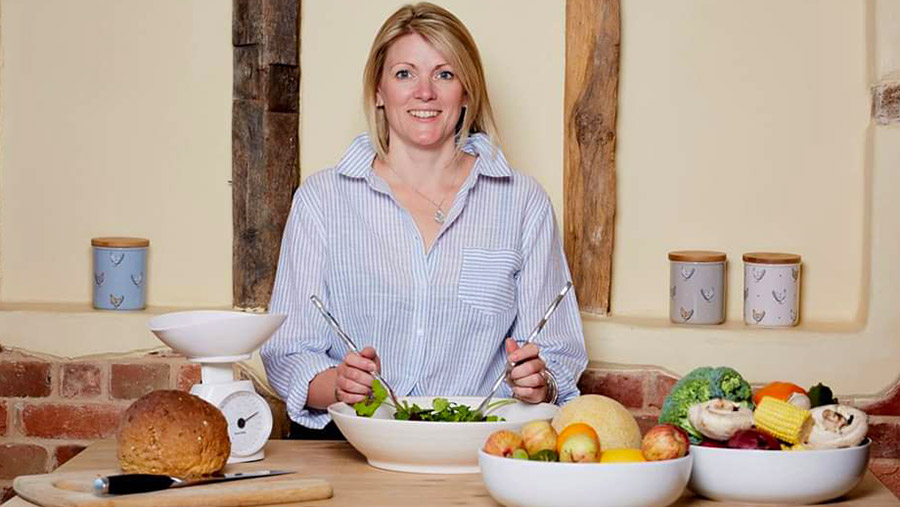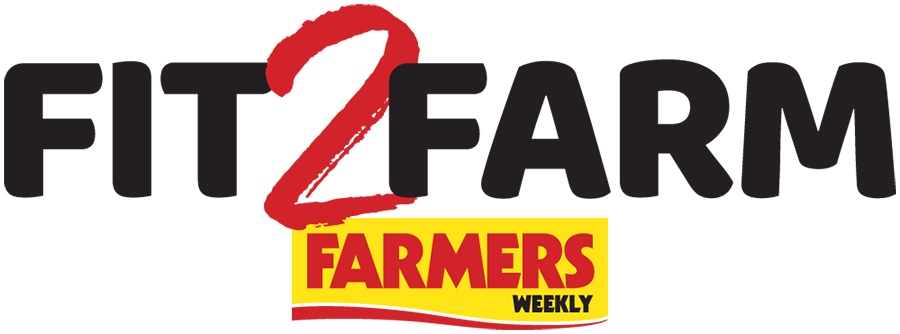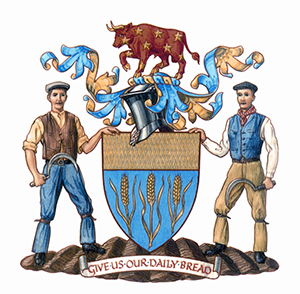Fit2Farm: Why farmers need to eat better and exercise more
 Dietician Anna Groom
Dietician Anna Groom Fewer than one in five British farmers eats a healthy diet – despite producing some of the best food in the world, reveals a Farmers Weekly survey.
Only 18% of farmers and farmworkers said they ate five portions of fruit and vegetables every day – the minimum amount recommended by Public Health England as part of a healthy diet. More worryingly, perhaps, 4% of respondents said they rarely ate enough fruit and vegetables at all.
The survey findings were published as part of Farmers Weekly’s Fit2Farm campaign to highlight the importance of healthy farmers to healthy farm businesses. The study was carried out in association with Bayer and Isuzu.
Long working hours are believed to be among the reasons for poor diet. Farmers work an average of 65 hours each week – with many working much more than that, found the survey. Some respondents suggested they were too busy to think properly about what they ate.
Read all of the articles in the Fit2Farm series
Fit2Farm: How farmers can improve their mobility to avoid injury
Fit2Farm: How a farmer’s wife helps others in tough times
Fit2Farm: Why farmers need to eat better and exercise more
Fit2farm: Wellbeing guru shares top health tips for farmers
Fit2Farm: How a better work-life balance benefits farm
Fit2Farm: Hard work and long hours take toll on farmers
Fit2Farm: FW campaign to improve farmers’ health
Video: Rugby star signs up to be Fit2Farm ambassador
Advice on fixing relationship problems for farming couples
Better diet
But some farmers are taking time out to improve their diets – including a small group of six farmers in Suffolk who attend a weekly Fit & Farming health improvement course run by qualified dietician Anna Groom.
A farmer’s daughter herself, Mrs Groom designed the course specially for farmers who want to manage their weight – and reduce their long-term risk of weight-related health complications such as Type 2 diabetes, high blood pressure and elevated cholesterol levels.
“Like most men, farmers are often reluctant to seek advice from their GP,” she explains. “But when they come together as a group of farmers, they are more willing to talk and discuss things like health and diet because they understand each other’s way of life.”
Based at Edwardstone, near Sudbury, the AEG Nutrition course takes place every Thursday evening for eight weeks. On week one delegates have their height, weight, body mass index and blood pressure taken. Weights are repeated weekly, but the other measurements are repeated only at the end of the course.
Healthy lifestyle
“Farming is perceived as a healthy lifestyle, but that isn’t always the case,” says Mrs Groom. “But farmers are more knowledgeable than many other people when it comes to food. It’s all about encouraging small changes that everyone can manage.”
The next course starts in February. It purposely avoids any fad diets or quick fix plans. Instead, it teaches evidence-based dietetics that can deliver long-term health benefits. Each week, a different nutrition topic encourages participants to make active changes in their food choice and portion size.
Partners are invited some evenings and there is a talk by a local practice nurse about health tests available at doctors’ surgeries.
Course participants also take part in yoga or pilates to support improvements in strength and flexibility. There is a special emphasis on core exercises to help reduce and prevent back pain through appropriate posture and lessons that can be practiced at home.
Less physical
Peter Knott is one of the local farmers on the latest course. “A few years ago, a friend in his early 50s had a serious stroke,” he says. “We were about the same age. It made me realise I should look after myself. I’ve got three daughters and I want to be around as long as I can.”
Farming is a much less physical occupation than it once was, adds Mr Knott. “When I first came home from college everything came in bags and it was all lift, lift, lift. We were physically fit and you worked hard. Now, everything is mechanical.”
Small changes bring big benefits
Farmer John Lee says he is more aware of what he eats after attending a Fit & Farming course run by specialist dietician Anna Groom.
“I am more aware of fatty foods and I am trying to avoid them,” he says.
“I eat more wholegrain bread and I have reduced the amount of potatoes. I’m also eating more vegetables and less meat. My alcohol consumption has gone down quite considerably too.”
The Fit & Farming course brings together small groups of farmers once a week to talk about food and swap healthy eating tips. Mr Lee, who farms at Rattlesden, Suffolk, says he is reaping big rewards and has lost weight by making small changes to his diet. He feels healthier too.
“I was quite overweight in the summer. I reckon I spend at least four months during harvest and the autumn sitting in a combine or tractor seat.
“You don’t get easy opportunities to eat or exercise properly like you do in other parts of the year.”
The eight-week course focuses the mind, adds Mr Lee. Doing it with other farmers makes for some healthy competition and some good banter, he adds. Each session starts with a weigh-in – and some weeks there are food-tasting sessions, too.
Eating a healthy, balanced diet is an important part of maintaining good health – and can help you feel your best too, says Public Health England.
This means eating a wide variety of foods in the right proportions, and consuming the right amount of food and drink to achieve and maintain a healthy body weight – including at least five portions of fruit and vegetables daily.
The government’s Eatwell Guide shows how to have a healthy, balanced diet. People should try to:
- Eat five portions of fruit and veg a day
- Base meals on starchy foods such as potatoes, bread, rice or pasta
- Have some dairy or dairy alternatives
- Eat some beans, pulses, fish, eggs, meat and other protein
- Choose unsaturated oils and spreads, eaten in small amounts
- Drink plenty of fluids
- Choose a variety of different foods from the five main food groups:
- Vegetables and legumes/beans
- Fruit
- Grain (cereal) foods, mostly wholegrain and/or high cereal fibre varieties
- Lean meats and poultry, fish, eggs, tofu, nuts and seeds and legumes/beans
- Milk, yoghurt cheese and/or alternatives, mostly reduced fat
Foods and drinks high in fat, salt and sugar should be consumed less often and in small amounts. Most people in the UK consume too many calories, fat, sugar and salt – and not enough fruit, vegetables, oily fish or fibre.
Stay hydrated to be top performer, says Fit2Farm ambassador
Drinking plenty of fluids is as important as healthy eating if you want to be a top performer, says Welsh rugby international and Fit2Farm ambassador Dan Lydiate.
The 31-year-old Ospreys flanker, whose family runs a sheep and beef farm near Llandrindod Wells, has teamed up with Farmers Weekly to highlight the importance of health and well-being among farmers and farm workers.
“Diet is massively important for rugby players. You can train as hard as you like, but you have to eat the right things. If you are eating the wrong things, it is like putting petrol in a diesel engine – you’re going to break down.
“The biggest thing for us is staying hydrated. You need to make sure you are properly fuelled up and hydrated. When you are dehydrated, it affects your train of thought and you’re not thinking straight. In farming too, that can be dangerous.
“Accidents can happen, especially if you are operating heavy machinery. It’s the last thing you want, so it is important to eat good food and make sure you drink enough water, squash or tea and coffee. Make sure you are getting plenty into you.”

Farmers Weekly has launched a new campaign to help farmers discover how they can improve their own health, wellbeing and work-life balance.
It’s all about making sure you are in top shape, physically and mentally to run your farm business.
We’ve been joined by business and charities to raise awareness for this campaign. Read about our sponsors below.
Our sponsors

Bayer
Your wellbeing is just as important to your farm’s future as looking after your land, crops and animals. Looking after yourself helps you be more productive and confidently face new challenges.
At Bayer, we have health and nutrition at our core, so we are delighted to support Fit2Farm.
Find out more at cropscience.bayer.co.uk/wellbeing
Isuzu

Isuzu are proud to support UK farmers of today and as the pick-up professionals we understand that having the right tools and equipment are vital elements to making the working day go that much easier.
That’s why with Isuzu, our pick-ups are strong, durable and built to go the distance, so you can focus the job in hand.
Find out more about the Isuzu D-Max range on our website
Our charity partners
Farm Community Network

The Farming Community Network (FCN) is a voluntary organisation and charity that supports farmers and families within the farming community through difficult times.
FCN’s volunteers provide free, confidential, pastoral and practical support to anyone who seeks help, regardless of whether the issue is personal or business-related.
Helpline: 03000 111999
E-Helpline: help@fcn.org.uk
Helpline is open every day of the year from 7am to 11pm
Website: www.fcn.org.uk
Farm Safety Foundation

The Farm Safety Foundation is an award-winning charity raising awareness of farm safety among the next generation of farmers.
Through training and campaigns such as Farm Safety Week and Mind Your Head, the Foundation tackles the stigma around risk-taking and poor mental health, ensuring that that next generation of farmers is equipped with specific skills to live well and farm well.
Website: www.yellowwellies.org
Worshipful Company of Farmers

The complexity, risk and relentless uncertainty within agriculture today take a tremendous toll on all those who work in the industry; never before has resilience been so crucial.
Recognising this we are delighted to support this new initiative to promote good health and wellbeing. It’s a fresh approach and demonstrates that working together we are always stronger.
Website: farmerslivery.org.uk

